Anxiety can begin as simple worry but grow into a serious condition that affects how you think, feel, and function. It happens when your brain’s “danger system” becomes too active, even when no real danger exists. Understanding what triggers anxiety, how it affects your body, and what treatments can help is the key to regaining balance.
What Is Anxiety?
Anxiety alerts you to danger and keeps you safe. When you face real threats (like a barking dog or a near car accident), your body releases stress hormones such as adrenaline and cortisol. This makes your heart beat faster and your senses sharper. But when this system turns on too often or stays on for too long, it starts to harm rather than help.
The Difference Between Normal Worry and an Anxiety Disorder
Everyone worries sometimes. Maybe you stress about a test or a work meeting. That’s normal and temporary. But if you constantly feel tense or fearful for no clear reason, it might be an anxiety disorder. The main difference lies in duration and intensity, worry passes, while anxiety lingers and interferes with daily life.
How Anxiety Affects Your Brain and Body
When you feel anxious, your brain sends danger signals even if there’s no threat. This triggers a “fight or flight” response. Your heart pounds, your breathing quickens, and your muscles tighten. Over time, constant anxiety can change the way your brain works. It can make it harder to relax, sleep, or focus.
Short-Term vs. Chronic Anxiety
Short-term anxiety helps you stay alert and focused in stressful moments. It can even improve performance during exams or presentations. Chronic anxiety, however, drains your energy, affects sleep, and can lead to health problems like high blood pressure.
Anxiety vs. Stress: Understanding the Distinction
Stress usually comes from outside factors, like deadlines or family problems. Anxiety often comes from within. It can appear even when things are going well. Stress fades when the problem is solved, but anxiety may remain, creating a constant state of worry.
Genetic Predisposition and Family History
If anxiety runs in your family, you may be more likely to develop it. Certain genes affect how your brain responds to stress. Still, having a family history doesn’t mean you will definitely have anxiety; it only raises your risk.
Imbalance in Brain Chemicals (Neurotransmitters)
Your brain uses chemicals called neurotransmitters to control mood and emotions. Low or imbalanced levels of serotonin, GABA, and norepinephrine can increase anxiety. These chemical issues explain why medications often focus on restoring balance in the brain.
Chronic Stress and Environmental Pressures
Long-term stress from work, finances, or family problems can trigger anxiety. For example, a job that constantly demands more than you can handle may lead to chronic worry and fatigue. Environmental stress can also come from noise, pollution, or unsafe neighborhoods.
Traumatic Experiences or Post-Traumatic Stress
A traumatic event like an accident, abuse, or natural disaster can deeply affect your brain. The body remembers trauma, which may later show up as anxiety or post-traumatic stress disorder (PTSD). People may avoid places or situations that remind them of what happened.
Medical Conditions and Hormonal Imbalances
Certain health issues can mimic or cause anxiety symptoms. Thyroid disorders, heart rhythm problems, and hormone changes during menopause or puberty can all play a role. If you notice anxiety with physical symptoms, see a doctor to rule out underlying conditions.
Excessive Caffeine, Alcohol, or Stimulant Use
Caffeine can boost alertness, but too much can make your heart race and trigger anxiety. Alcohol may calm you temporarily, but it worsens anxiety later. Drugs and energy drinks overstimulate the brain and body, leading to panic or restlessness.
Relationship Between Depression and Anxiety Disorders
Anxiety and depression are closely linked. Many people experience both at the same time. Depression often follows long-term anxiety, while anxiety can worsen depression. Treating both conditions together gives better results. Understanding this depression to anxiety link helps improve recovery.
Common Triggers of Anxiety
Causes of sudden anxiety often start from triggers that overwhelm your ability to cope.
Financial Stress or Job-Related Pressure
Money problems, debt, or fear of losing a job are powerful triggers. Worrying about bills or job security can make your body feel like it’s under constant attack.
Relationship Conflicts and Social Pressures
Fights, breakups, or fear of judgment in social situations can trigger anxiety. Some people experience extreme nervousness when meeting new people or speaking in public.
Major Life Changes — Loss, Relocation, or New Responsibilities
Big life shifts such as moving, losing a loved one, or becoming a parent can shake your sense of control. Even positive changes, like marriage or a promotion, can bring stress.
Health-Related Fears or Chronic Illness
Concerns about illness or medical tests often spark anxiety. Living with a chronic disease can make you constantly alert to body sensations, leading to panic attacks.
Sleep Deprivation and Poor Lifestyle Habits
Too little sleep and irregular eating make anxiety worse. Caffeine, skipped meals, and screen time before bed can all disrupt your natural calm. A balanced routine helps reduce anxiety.
Types of Anxiety Disorders
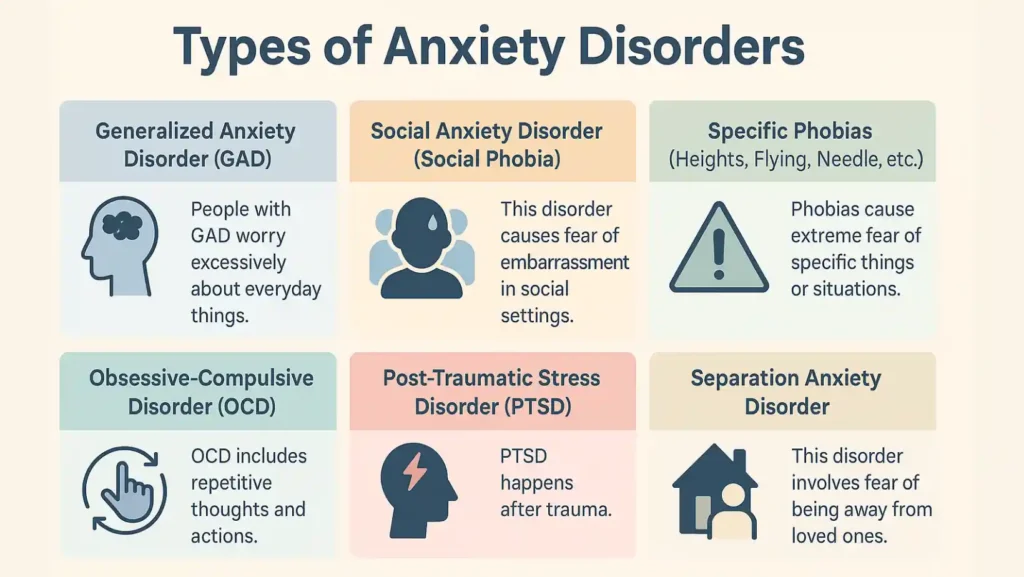
There are different types of anxiety, each with unique features.
Generalized Anxiety Disorder (GAD)
People with GAD worry excessively about everyday things. They expect the worst even when nothing is wrong. GAD often causes fatigue, tension, and restlessness.
Social Anxiety Disorder (Social Phobia)
This disorder causes fear of embarrassment in social settings. You might blush, tremble, or avoid gatherings entirely. It often begins in the teenage years.
Specific Phobias (Heights, Flying, Needles, etc.)
Phobias cause extreme fear of specific things or situations. Even thinking about the trigger can cause panic. For instance, fear of flying may cause physical shaking or nausea before a trip.
Obsessive-Compulsive Disorder (OCD)
OCD includes repetitive thoughts and actions. For example, you might wash your hands repeatedly to stop intrusive fears. It’s driven by anxiety that something bad will happen.
Post-Traumatic Stress Disorder (PTSD)
PTSD happens after trauma. It brings flashbacks, nightmares, and avoidance behaviors. Loud sounds or certain places can reignite fear.
Separation Anxiety Disorder
This disorder often starts in childhood but can continue into adulthood. It involves a strong fear of being away from loved ones or familiar places.
Anxiety Attack Symptoms
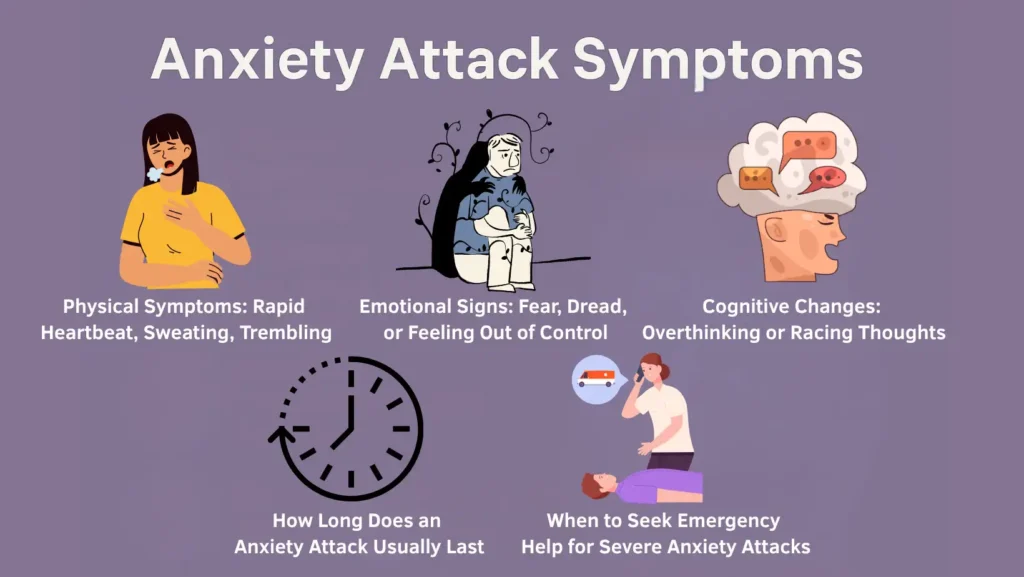
Knowing anxiety attack symptoms helps you recognize when your body is overwhelmed.
Physical Symptoms: Rapid Heartbeat, Sweating, Trembling
During an anxiety attack, your heart may race. You might sweat, tremble, or feel dizzy. Some mistake these signs for a heart attack.
Emotional Signs: Fear, Dread, or Feeling Out of Control
Emotionally, you may feel a wave of fear or doom. You might think you’re losing control or going crazy.
Cognitive Changes: Overthinking or Racing Thoughts
Your mind floods with “what if” thoughts. It becomes hard to focus or make decisions.
How Long Does an Anxiety Attack Usually Last
Most attacks last between 10 and 30 minutes, though symptoms can linger longer. Fatigue often follows.
When to Seek Emergency Help for Severe Anxiety Attacks
If you experience chest pain, trouble breathing, or believe you’re having a heart attack, seek emergency care.
Shared Causes: Genetics, Brain Chemistry, and Stress Hormones
Anxiety attacks result from a mix of genetic, chemical, and environmental factors. High stress hormone levels can make you more prone to attacks.
Diagnosis: How Anxiety Disorders Are Identified
Doctors and therapists use several steps to diagnose anxiety accurately.
Rule-Out of Medical Causes (Thyroid, Heart, or Hormone Issues)
They begin by checking your physical health. Thyroid or hormone imbalances can mimic anxiety symptoms.
Screening Tools Used by Mental Health Professionals
Therapists use questions and scales to measure anxiety. These tools help determine how severe it is and what treatment suits you best.
Anxiety Treatment Options
Effective anxiety treatment often combines therapy, medicine, and lifestyle changes.
Cognitive Behavioral Therapy (CBT) and Talk Therapy
CBT teaches you to identify negative thoughts and replace them with realistic ones. It helps you face fears instead of avoiding them.
Medications for Anxiety Management (SSRIs, Beta-Blockers, etc.)
Medicines like SSRIs adjust brain chemicals. Beta-blockers reduce physical symptoms like a rapid heartbeat. Always consult a doctor before taking medication.
Relaxation Techniques and Breathing Exercises
Deep breathing and muscle relaxation can stop panic in seconds. Practicing them daily trains your body to stay calm.
Mindfulness, Meditation, and Journaling
Mindfulness and journaling help you notice patterns in your thoughts. They bring clarity and emotional control.
Lifestyle Modifications: Sleep, Diet, and Exercise
Good sleep strengthens emotional balance. Regular workouts release “feel-good” chemicals that reduce stress. A healthy diet supports brain function.
Combining Therapy with Medication for Long-Term Balance
The best results often come from combining both. Therapy builds coping skills, while medication stabilizes your mood and brain chemistry.
Prevention and Coping Tips
You can prevent anxiety from worsening by building healthy habits early.
Identify Personal Anxiety Triggers Early
Keep a journal of situations or foods that increase your anxiety. Awareness helps you take control.
Maintain Consistent Sleep and Meal Schedules
Regular sleep and meals stabilize hormones and energy levels, preventing mood swings.
Reduce Caffeine and Screen Time
Cutting caffeine helps steady your heartbeat. Reducing screen use before bed improves rest.
Build Social Support and Healthy Boundaries
Stay close to supportive friends. Learn to say no when you’re overwhelmed.
Seek Professional Help Before Symptoms Worsen
Therapy or counseling can stop anxiety from turning chronic.
Persistent Anxiety Affecting Daily Function
If anxiety keeps you from daily tasks, don’t ignore it. Treatment can restore normal life.
Panic Attacks That Disrupt Work or Relationships
Frequent panic attacks signal a deeper issue. Therapy helps manage them.
Physical Symptoms Without Medical Explanation
If doctors find nothing physically wrong, anxiety might be the cause.
Anxiety Linked with Depression or Substance Use
Treat both issues together for the best outcome.
FAQs
What Are the Main Causes of Anxiety?
The main causes of anxiety include genetics, brain chemistry, stress, trauma, and unhealthy habits. Medical issues or substance use can also increase anxiety risk.
Can Anxiety Be Cured Permanently?
Some people recover completely with therapy, medication, or lifestyle change. For others, long-term management keeps symptoms mild and under control.
What’s the Difference Between Anxiety and Panic Disorder?
Anxiety is ongoing worry, while panic disorder causes sudden, intense attacks. Both share similar roots, including causes of anxiety like stress and brain chemistry imbalance.
How Is Anxiety Treated Naturally?
Natural anxiety treatment includes exercise, sleep, meditation, therapy, and reduced caffeine. These changes can ease symptoms without medication.
How Do I Know If My Anxiety Is Serious?
If anxiety stops you from working, studying, or enjoying life, it’s serious. You should seek professional help.
When Should I See a Doctor for Anxiety?
You should see a doctor when anxiety or panic attacks affect your health or relationships. Early care improves recovery.


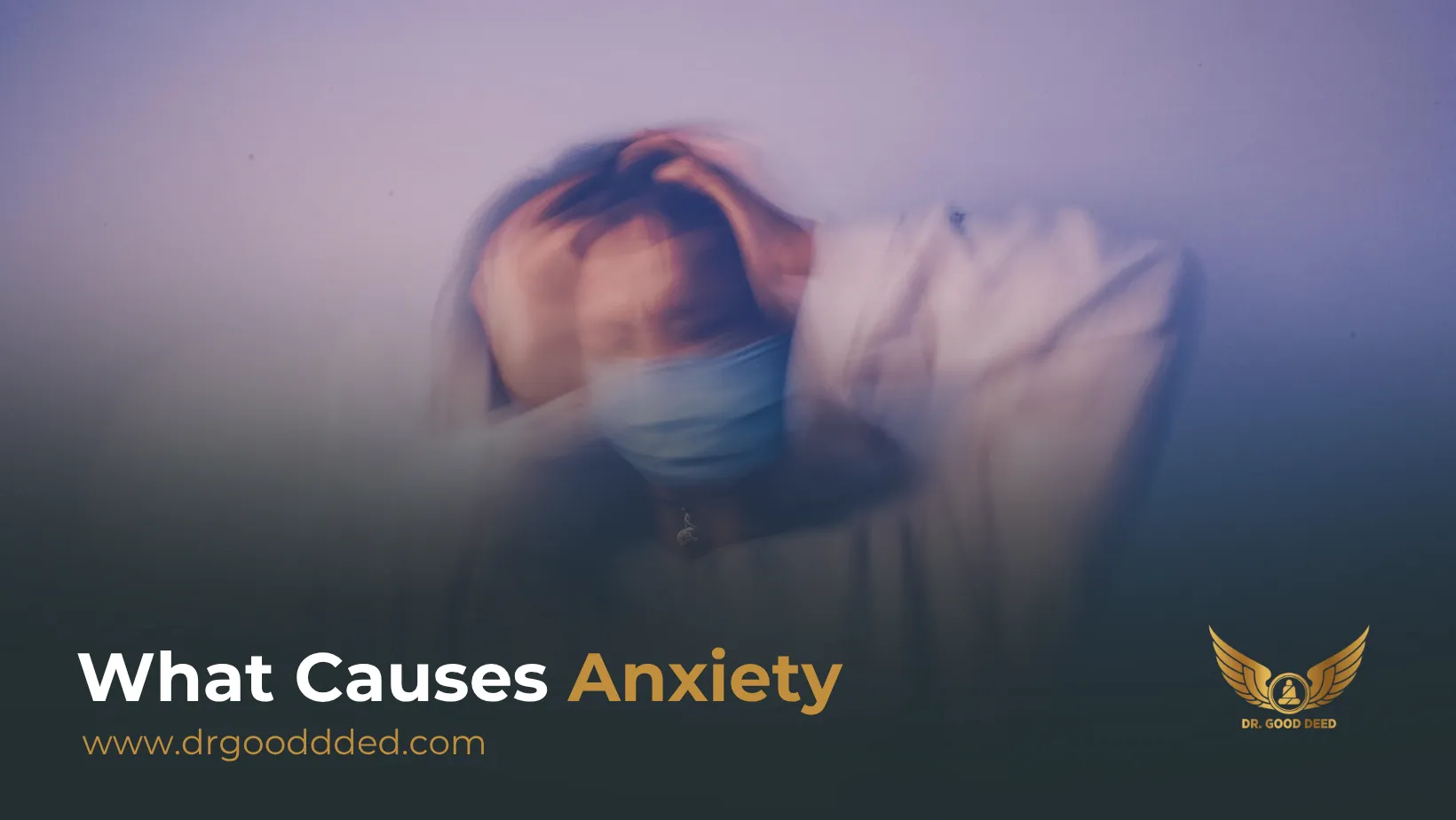
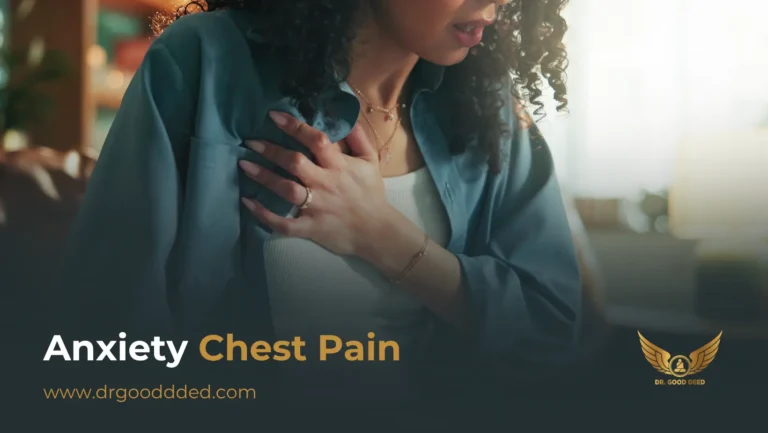

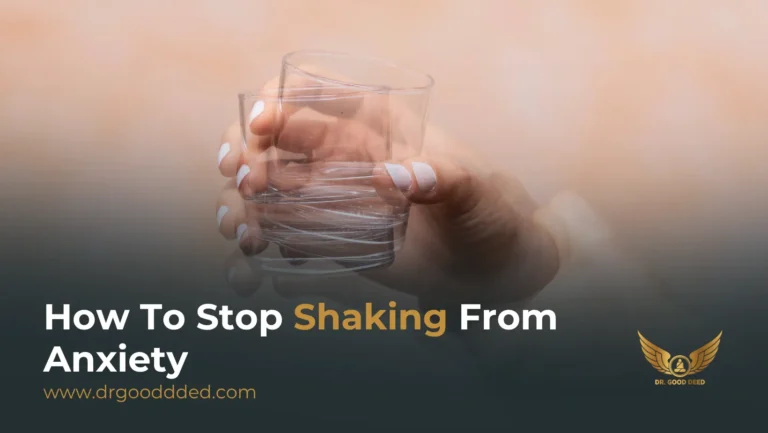
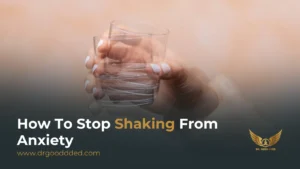
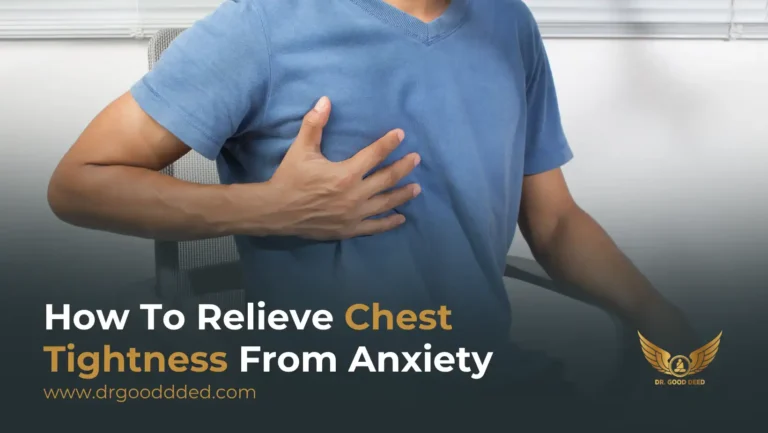
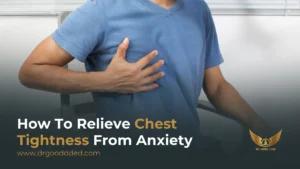
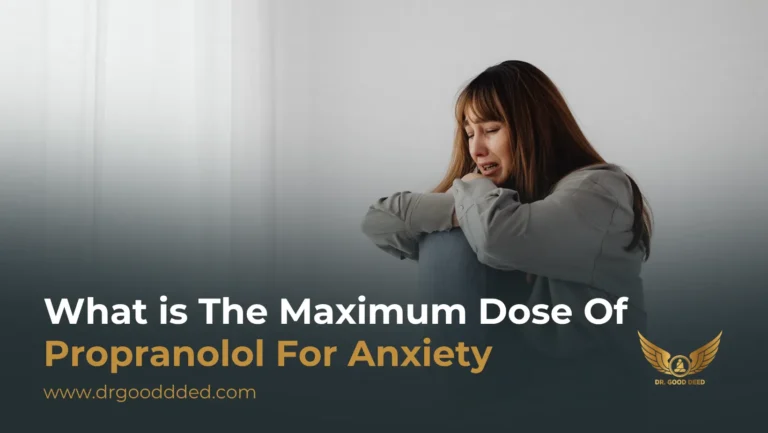
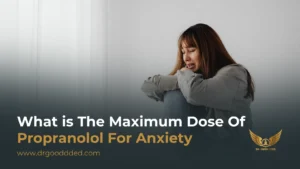

Leave a Comment